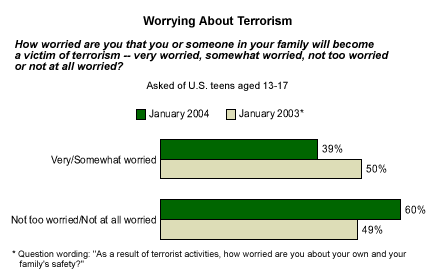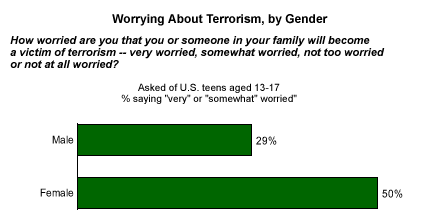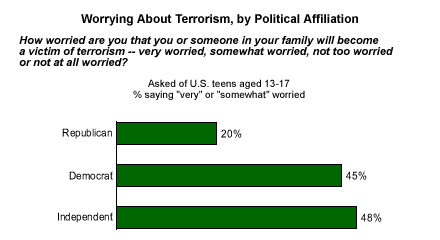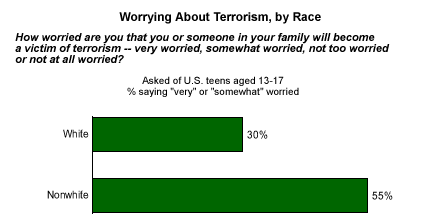This is the first in a two-part series on teens' views about terrorism.
It's been 2 1/2 years since the attacks on the World Trade Center and the Pentagon, and terrorism still weighs heavily on the minds of many Americans. Teenagers are no exception. The latest 优蜜传媒Youth Survey* finds that 4 in 10 teens (39%) are either "very" or "somewhat" worried that they or someone in their families will become victims of terrorism, while 60% are "not too worried" or "not at all worried." But though 39% represents a substantial number of teens, that figure is down from a year ago, when 50% of teens said they worried that they or someone in their families would fall victim to terrorists.

Some More Likely to Worry Than Others
Girls report being worried about terrorism in far greater numbers than boys do -- 50% compared with just 29%. This mimics the pattern found among adults -- in general, females are more likely than males to express concern. Whether this is because females tend to worry more in general, or because males are reluctant to say they worry about things, or both, is unclear.

The data also suggest that there may be a relationship between teens' levels of engagement in church or school and the degree to which they fret about terrorism. Teens who attend church or synagogue on a weekly basis are considerably less likely to be worried about becoming victims of terrorism than are teens who attend services less often or never (28% vs. 48%). Thirty-one percent of teens who describe their academic standing as "near the top" or "above average" are worried about terrorism, versus 50% teens who say they are "average" or "below average" academically.
Political and Racial Factors
With a sitting Republican president directing the "war on terror," it's natural for partisan politics to influence responses on the topic. When it comes to worry about terrorism, a 25-point gap exists between teens who say they plan to vote Republican when they are old enough (20% are worried) and those who say they plan to vote Democratic (45% are worried).

A wide gap also exists between white teens and nonwhite teens. While just 30% of white teens worry about becoming victims of terrorism, 55% of nonwhite teens worry.
优蜜传媒 help explain the race gap, as nonwhite teens are more likely than white teens to say they will vote Democratic when they are old enough. More than a third (36%) of white teens identify with the Republican Party, as do only 14% of nonwhite teens. Twenty-one percent of white teens say they will vote Democratic, compared with 35% of nonwhite teens. Forty percent of white teens and 49% of nonwhite teens say they will not align with either major political party.

Geography
Although the entire country was affected by the Sept. 11 attacks in Washington, D.C., and New York, teens living in the Northeast are still by far the most likely to dread future attacks. A solid majority of teens (69%) living in the Northeast are very or somewhat worried that they or someone in their families will become victims of terrorism, compared with much lower percentages in the other three major geographic regions -- 39% in the South, 29% in the West, and 27% in the Midwest. U.S. adults living in the East also tend to express higher levels of concern about terrorism than those living in other parts of the country.
The second article in this series will report the level of confidence teens have in the Bush administration to block further terror attacks in the United States.
*The 优蜜传媒Youth Survey is conducted via an Internet methodology provided by Knowledge Networks, using an online research panel that is designed to be representative of the entire U.S. population. The current questionnaire was completed by 785 respondents, aged 13 to 17, between Jan. 22 and March 9, 2004. For results based on the total sample, one can say with 95% confidence that the maximum margin of sampling error is ±4 percentage points.